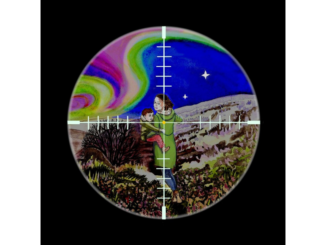
Chopanito / CC BY
In continuing my series of articles on the striking consistencies of theme and message within the Old and New Testaments, it seems apt not to discuss Lent and Jesus’ Forty Days in the Wilderness which followed His baptism in the River Jordan by John the Baptist.
For God’s chosen people Israel and many of their leaders, the desert was a place of testing, reflection and renewal, and a period of Forty Days had a symbolic resonance dating back to the time of Noah’s Flood which was God’s sparing of a remnant of a humanity which had fallen into wickedness. It became a time of abstinence and self-sacrifice, enduring the worst that Nature and Satan could do, a testing of one’s faith in the most difficult of conditions. Finally, it was a time of reflection, without the distractions of others and everyday life in places where man’s presence hardly existed, a place where one could neither hide from oneself nor from the small calm voice of God, the voice that Moses heard in the burning bush in the Sinai desert.
When the Israelites were freed from slavery in Egypt, they wandered 40 years in the wilderness because they were not deemed sufficiently faithful to Jehovah to be worthy of entry into the Promised Land. It took 40 years and the replacement of one generation by a younger one to purge away the faithlessness of the Children of Israel and prepare them for the challenges of conquering and settling the Holy Land. So, unlike the story of the Flood, not only is there an element of escaping destruction in the story of the Exodus, but also preparation for new challenges ahead – a type of ‘detox’ as we see later with Moses again when he went to the mountain of the Lord in the Sinai wilderness and stayed there for 40 days and nights in prayer and fasting (Exodus 24:18).
The examples from the time of Moses set a pattern for other would-be spiritual leaders of the Hebrews facing great challenge. For instance, Elijah, after he was fed with bread from heaven, journeyed through the wilderness without any food for 40 days to the mountain of God (1 Kings 19:8). This was at the lowest ebb in Elijah’s fortunes when he had been run out of Israel by Ahab and Jezebel, and it looked at is Baal worship was triumphing verf that of Jehovah. In those 40 days Elijah failed the test of true faith in Jehovah by falling into despair and was in effect put of notice of redundancy by God, so not even one of the greatest of God’s prophets would inevitably pass the test.
Jesus in the Wilderness
So, we can see that, as so often in the New Testament, that Jesus was following a path well-trodden in the Old Testament but taking it to its completion. His 40 days in the wilderness was Jesus testing Himself – did He have the strength to pursue a ministry that would end in His appalling death? If He couldn’t endure the solitude, the heat, the insects, the dangerous animals, the thirst, the hunger of the desert, and then at its end resist the temptations offered by Satan (acting in a very similar way to the Satan of the Book of Job) to lure Him away from His mission, how would He have the strength of conviction to endure the Cross?
In many ways the three temptations offered by Satan to Jesus were the antithesis of the things Jesus was doing without:
- The first temptation is for food for a man fasting in the desert – a basic human need which Jesus overcame. Jehovah didn’t feed Him in the way He did the people or Israel or Elijah.
- The second temptation is for safety, tempting God the Father to prevent Jesus’ death by intervening. In some ways this is the most interesting of the temptations and I will discuss it shortly.
- The final temptation is for Earthly power, worldwide imperium granted by Satan. “Think of all the good you could do Jesus if you ran the world right now.” The temptation of every would be autocrat which led to hundreds of millions of corpses in the 20th century alone, but Jesus knew His kingdom was not of this world or that time, something He repeated to Pilate when under cross-examination. It’s why Christians should resist every utopian ideology that says there is an Earthly solution to the woes of Mankind: ideologies, other religions, that promise such things are traps for the unwary set by the Devil who exploits the vanity, hubris and idealism of humanity.
The second temptation is the most interesting because here Satan is pushing Jesus to put The Father’s love for Him to the test – “prove to me Jesus that God the Father loves you by saving you.”
Jesus was tempted twice similarly in even more extreme circumstances subsequently – in the Garden of Gethsemane when He knew the authorities were coming to arrest Him and later when on the cross He cried out “My God, why hast thou forsaken me?”
Ultimately Jesus passed even this final appalling test to save Himself from death. He would accept God’s Will, His fate and destiny just as did Job in the Old Testament. It’s the hardest part of faith in many ways, enduring suffering and loss while not understanding why a loving God permits such things. It’s perhaps for many people the greatest barrier to accepting faith in Christ – how can God be loving while allowing suffering and death? We of course know that this is the reverse side of the coin of the gift of Free Will given to us but the truth is that we are here to serve God’s purposes, not He ours’, but for modern proud humanity that is a very bitter pill to swallow.
So, Jesus was tested just the same way as we at times in our lives but kept the faith. Two thousand years of monks and nuns have devoted their lives to similar self-denial as have countless unknown lay people, people we perhaps know ourselves.
And so, finally, back to the 40 Days. The 40 days of rain that led to the Flood were the washing away of the Sins of the world, one might say by God’s tears. For Moses, Elijah and Jesus it was a period of enforced testing and reflection. For us, the 40 days of Lent are both, a time of repentance for our Sins and reflection as to how to become better Christians, more like Jesus, and better people as a consequence.
© 1642again 2020
The Goodnight Vienna Audio file
Audio Player


